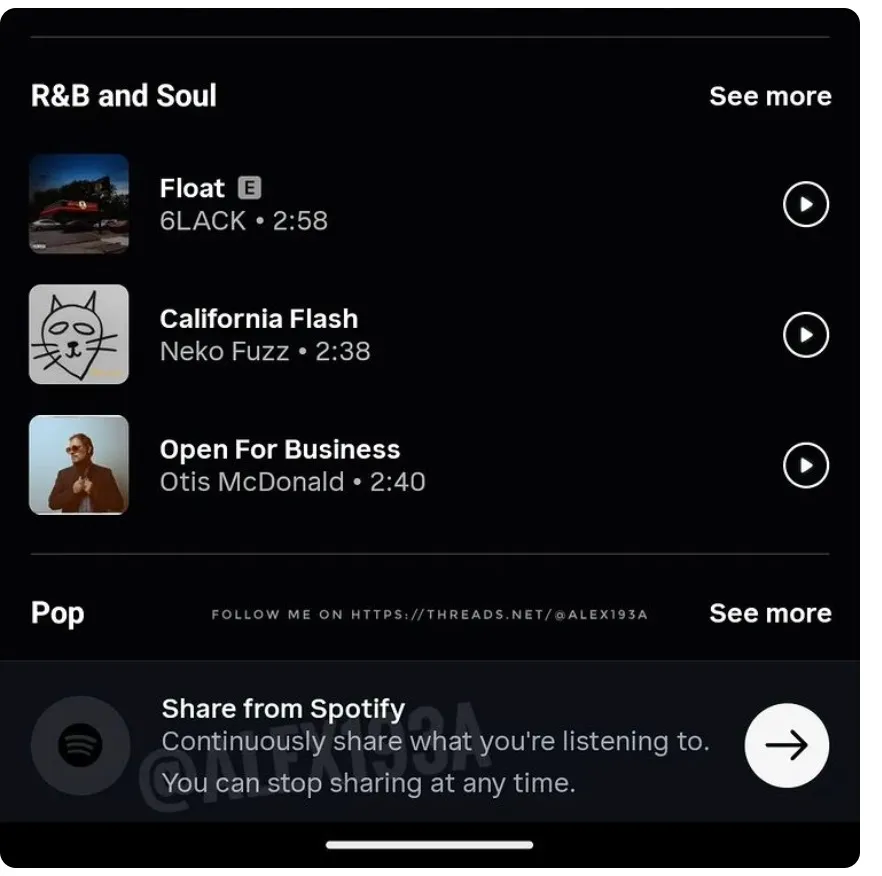Meta and Spotify are reportedly working on a groundbreaking integration that could transform how users share and experience music on Instagram. The tech giants are testing a new feature that would allow Instagram users to continuously share the music they’re listening to via Instagram’s Notes, making the app a central hub for real-time music discovery and social interaction.
The potential new feature was first uncovered by reverse engineer Alessandro Paluzzi, known for his knack for discovering unreleased features in popular apps. While this exciting find doesn’t guarantee that the feature will be rolled out to the public anytime soon, it does hint at the innovative directions Meta and Spotify might be exploring.
A screenshot shared by Paluzzi on Meta’s Threads platform reveals a new option that would enable users to “continuously share” their music from Spotify, rather than simply picking a song from Instagram’s existing music catalog. Users would also have the flexibility to stop sharing at any time, ensuring that the feature remains under their control.

If launched, this feature would build on Instagram’s earlier music-sharing capabilities. Over a year ago, Instagram introduced the ability to share 30-second song clips via Notes, a feature that has since gained popularity. Notes, a tool that allows users to post quick updates or statuses above their Instagram inbox, has been available globally in markets where Instagram holds music licensing rights.
The proposed partnership with Spotify could streamline and automate music-sharing on Instagram, allowing users to post updates seamlessly, even while using other apps. This would not only enhance user engagement but also create a richer content ecosystem on Instagram, keeping users connected and engaged with their social circles.
The feature has a familiar ring, echoing the social networking capabilities currently available within Spotify’s own app. Spotify users can already connect with Facebook to see what their friends are streaming, and the company has been experimenting with a “Community” feature that shows real-time streaming activity on mobile. However, this feature is yet to be officially launched.
Spotify has consistently added social features to enhance user interaction, including podcast commenting and more detailed user profiles. Despite these efforts, the company recognizes that much of music discovery still happens on social networks where users have established connections and regularly engage with friends.
The Meta-Spotify collaboration seems to be more than just a rumor. Tech analyst Chris Messina recently observed that Instagram had added a “SpotifyiOS.framework” component to its app, likely around the release of Instagram version 338.0. This discovery followed Instagram’s recent introduction of a feature allowing users to add music to their profiles, a development made in collaboration with singer Sabrina Carpenter. Messina speculates that this could be part of a broader strategy to integrate Spotify more deeply into Instagram, potentially positioning the platform as a rival to TikTok in the music discovery space.
This wouldn’t be the first time Meta and Spotify have joined forces on music initiatives. In 2021, the two companies collaborated to create a miniplayer that allowed Facebook users to stream Spotify directly within the app. Their partnership has also been fueled by a shared rivalry with Apple, with both Meta and Spotify criticizing Apple’s App Store policies for stifling competition and innovation. Apple’s App Tracking Transparency (ATT) feature, in particular, has impacted Meta’s advertising business, while Spotify competes directly with Apple Music in the streaming space.
While neither Meta nor Spotify has officially commented on these recent developments, the potential for a deeper integration between the two platforms could mark a significant shift in how users discover, share, and engage with music on social media. Whether or not this feature becomes a reality, it’s clear that both companies are committed to exploring new ways to enhance the digital music experience.










